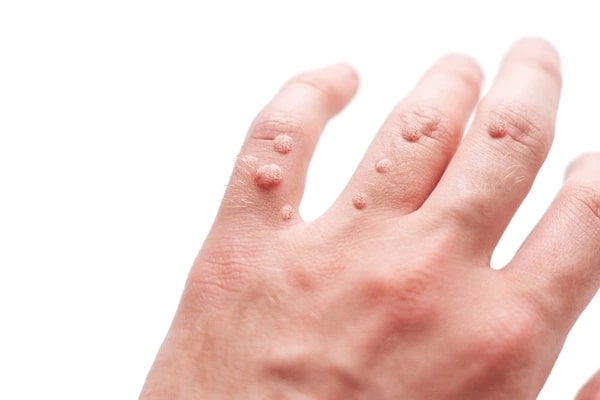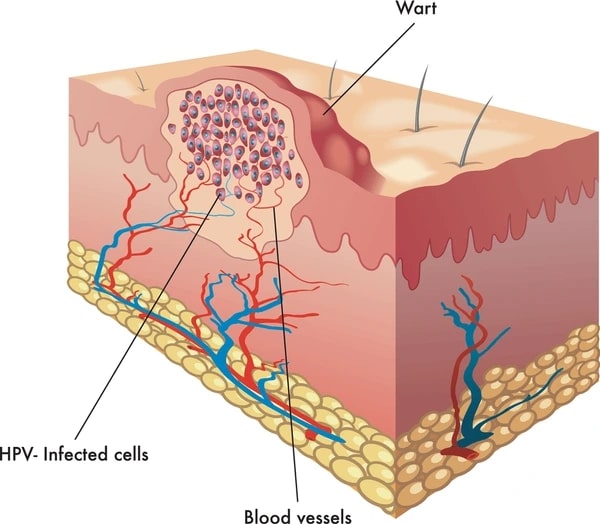Warts: How To Identify, Causes, Types, Treatment – By Dr. Sweta Vijay Nakhwa (Best Dermatologist in Thane West)
Have you ever noticed a rough, bumpy growth on your hand, foot, or face? It might be a wart. Warts are noncancerous skin growths caused by the human papillomavirus (HPV). While they’re usually harmless, warts can be unsightly and sometimes painful.
Proper diagnosis and treatment can help clear them up effectively.

What Are Warts?
Warts are benign skin growths resulting from an infection with the human papillomavirus (HPV). They often appear as small, grainy bumps on the skin and can develop on various parts of the body, including hands, feet, and face.
Symptoms of Warts
Warts typically present as:
- Small, grainy bumps
- Flesh-colored, white, pink, or tan
- Rough to the touch
- Clusters of warts sometimes forming a larger mass
- Pain or discomfort, especially with plantar warts (wart on foot)
Types of Warts
There are different types of warts, each with slightly varying characteristics:
- Common Warts (Verrucae Vulgaris): These are the most frequent type, appearing as rough, cauliflower-like bumps on hands, fingers, and knees.
- Plantar Warts: As the name suggests, plantar warts grow on the soles of the feet. They can be flat or inward growing, causing discomfort when walking or standing.
- Flat Warts: These smooth, flat-topped papules are more common in children and young adults. They can appear on the face, hands, legs, or arms.
- Filiform Warts: Thread-like projections around the mouth or nose, filiform warts are more prevalent in young adults.
- Periungual Warts: These warts grow around or under fingernails or toenails, sometimes distorting nail growth.

Causes of Warts
Human Papillomavirus (HPV)
HPV is the virus responsible for warts. There are over 100 different strains of HPV, and different strains tend to cause different types of warts.
Transmission and Risk Factors
Warts spread through direct contact with HPV. This can happen by touching a wart or something that has been in contact with a wart, such as a towel.
Risk factors include:
- Damaged or broken skin
- Sharing personal items
- Weakened immune system.
Wart Treatment Options
There are various approaches to wart treatment, depending on the severity, location, and type of wart.
Self-care and Over-the-Counter Treatments: For non-facial and non-genital warts, you might consider over-the-counter options like salicylic acid creams and plasters or freezing sprays. These work by gradually removing the wart layers.
Debridement, which involves carefully removing dead skin with a pumice stone or emery board, can also be helpful.
However, it’s crucial to consult a dermatologist before attempting any self-treatment, especially for facial warts or those showing no improvement.
Professional Wart Removal by a Dermatologist (Best Dermatologist in Thane West): When over-the-counter remedies fail, a dermatologist like Dr. Sweta Vijay Nakhwa (considered the Best Dermatologist in Thane West) can offer more effective solutions.
These include:
- Cryotherapy (freezing with liquid nitrogen)
- Electrosurgery (using an electric current to destroy the wart tissue)
- Laser therapy (using a laser beam to target and remove the wart)
- Cantharidin (applying a blistering agent to raise the wart for removal)
- Immunotherapy (injecting medications to stimulate the body’s immune response against the wart virus)
- Surgical excision (rare cases for large warts or those resistant to other treatments)
- Facial Wart Removal: Facial warts require special care due to the delicate nature of the skin. Dr. Sweta Vijay Nakhwa’s expertise in facial wart removal ensures minimal scarring and optimal cosmetic outcomes.
- Wart Removal Surgery: In some cases, such as with large warts or periungual warts, surgical removal might be necessary. Dr. Nakhwa will explain the procedure thoroughly and reassure patients about minimal scarring with proper post-surgical care.
Prevention of Warts
While warts are treatable, prevention is always better than cure. Here are some simple tips to reduce your risk of developing warts:
- Wash your hands frequently with soap and water, especially after using public restrooms or shaking hands with someone who has warts.
- Avoid picking or scratching existing warts, as this can spread the virus to other parts of your body.
- Don’t share personal items like towels, razors, or shoes with others, as these can harbour the virus.
- Wear sandals in public showers or locker rooms to minimize contact with contaminated surfaces.
Why Choose Dr. Sweta Vijay Nakhwa?
Expertise and Experience
Dr. Sweta Vijay Nakhwa is renowned for her expertise in dermatology. With extensive experience in treating various skin conditions, she offers personalized care and effective treatments for warts.
Skin Care Clinic in Thane West
The skin care clinic in Thane Westhttps://drswetavijaynakhawa.com/skin-care-clinic-in-thane/, led by Dr. Nakhwa, provides comprehensive dermatological services, including advanced wart treatment options. Patients receive the highest standard of care in a comfortable and professional environment.
Conclusion
Warts are a common skin concern, but they are treatable. Early diagnosis and proper treatment by a qualified dermatologist like Dr. Sweta Vijay Nakhwa, the Best Dermatologist in Thane West can help remove warts effectively and prevent them from spreading.
Dr. Nakhwa has extensive experience in treating all types of warts, including those on the face, ensuring the best possible cosmetic outcome.
Schedule an Appointment
If you have a wart that you’d like to discuss, don’t hesitate to schedule an appointment with Dr. Sweta Vijay Nakhwa at her skin care clinic in Thane West. With her expertise and personalized treatment approach, you can achieve clear, wart-free skin.
Contact Dr. Sweta Vijay Nakhwa’s clinic today to schedule your consultation and take the first step towards a wart-free future!
Book an appointment Here!
